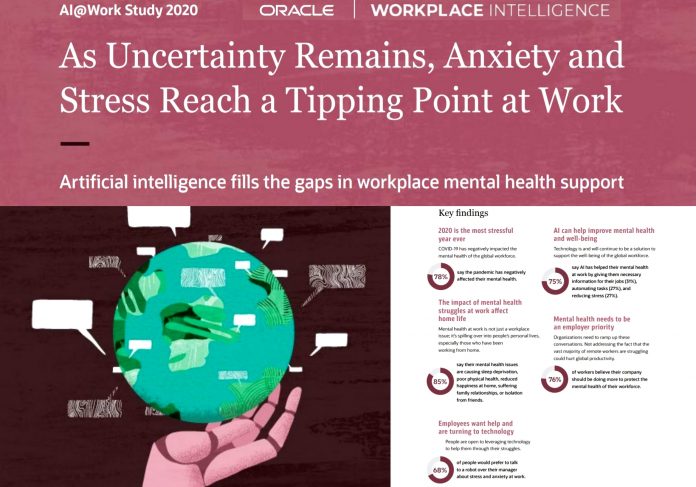This Saturday, October 10 it’s the World Mental Health Day. On this occasion I wanted to share with you a global Oracle study that is truly exceptional in its scope, concerning AI at work and mental health.
The results are indisputable: employees around the world prefer to turn to robots to preserve their mental health rather than seek help from their managers!
Let’s take now a closer look at the results of this Oracle & Workplace Intelligence Global Survey on AI and well being at Work:
- 82% of employees worldwide prefer to turn to robots to preserve their mental health rather than ask their manager for help!
- Deeply marked by the COVID-19 pandemic, the year 2020 is considered the most stressful year in history by employees around the world.
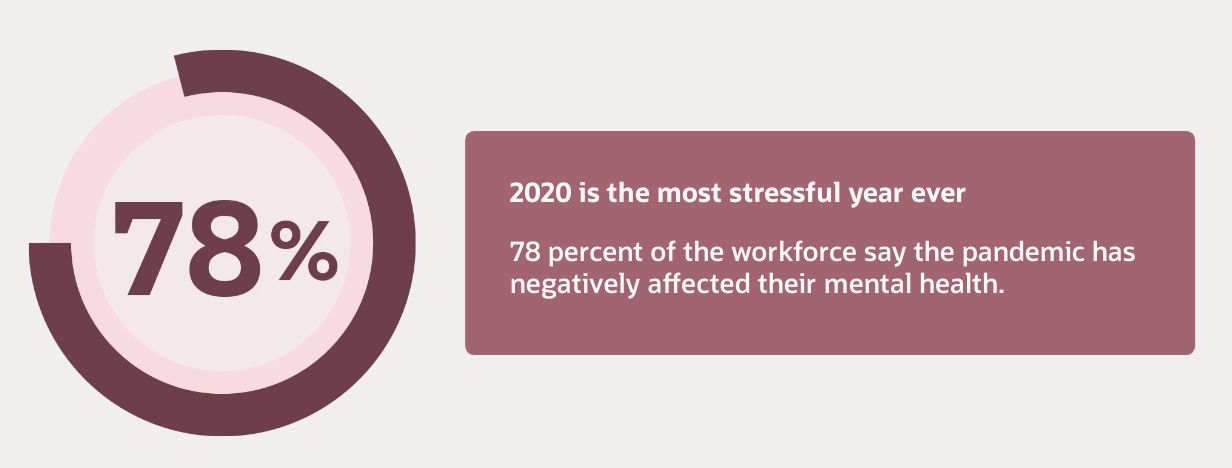
- The majority of them (78%) mention negative repercussions on their mental health and 85% feel that it has affected their private life.
- When it comes to stress and anxiety at work, 68% of employees around the world would prefer to confide in a robot rather than their manager.
- And if the issue of mental health has become a central concern, 76% of employees believe that their company should invest more in help them to preserve their mental health, with 75% believing that Artificial Intelligence can help to improve it.
2020 is seen as the most historical stressful year, according to employees around the world, and many would be willing to rely on the support of robots. This is one of the main lessons of a new study of Oracle and Workplace Intelligence, research and consulting firm in Resources Human Resources, conducted among 12,000 employees, executives, HR professionals, and managers from 11 countries, including France.
It also reveals that the COVID-19 pandemic brought stress, anxiety and exhaustion to the company professionals around the world, with technology being the preferred method of seeking help. While in 2019, only 8% of employees in France were enthusiastic about the idea of having use of AI, they are now 68% to say they are open to the idea of using a robot to listen to them or to follow a therapy!
Proof that the COVID-19 pandemic has really shaken up mentalities in a short period of time!
In France, 75% of employees say that the pandemic has had a negative impact on their mental health.
Overall, the mental health of employees worldwide is deteriorating as a result of the pandemic. More than ever, employees are facing significantly higher than usual levels of anxiety and depression due to COVID-19.
70% of worldwide people say they have experienced more stress and anxiety at work this year than in previous years.
– The pandemic has adversely affected the mental health of 78% of the world’s working population. The changes in the world of work to which employees have been forced to adapt at short notice have led to increased stress (38%), an imbalance between work and private life (35%), burnout (25%), depression due to lack of socialization (25%) and loneliness (14%).
– The new pressures of the global pandemic have combined with daily stressors in the workplace such as pressure to meet performance targets (42%), managing routine and tedious tasks (41%) and juggling unmanageable workloads (41%). While French employees can identify with these global averages, the employees seem to have been less affected since only 52% of the German respondents said they were more affected than others, Indian employees having the highest rates (84%).
86% of employees in France report that mental health problems at work have a negative impact on their personal life. The global pandemic has exacerbated mental health problems in the workplace, but the impact is not limited to working life, the consequences extend to life itself of employees.
85% of worldwide people surveyed said that mental health problems at work,
such as stress, anxiety or depression affect their private lives. And it is the younger generations (22-25 years old) who seem to suffer the most from this with 94% sharing this feeling.
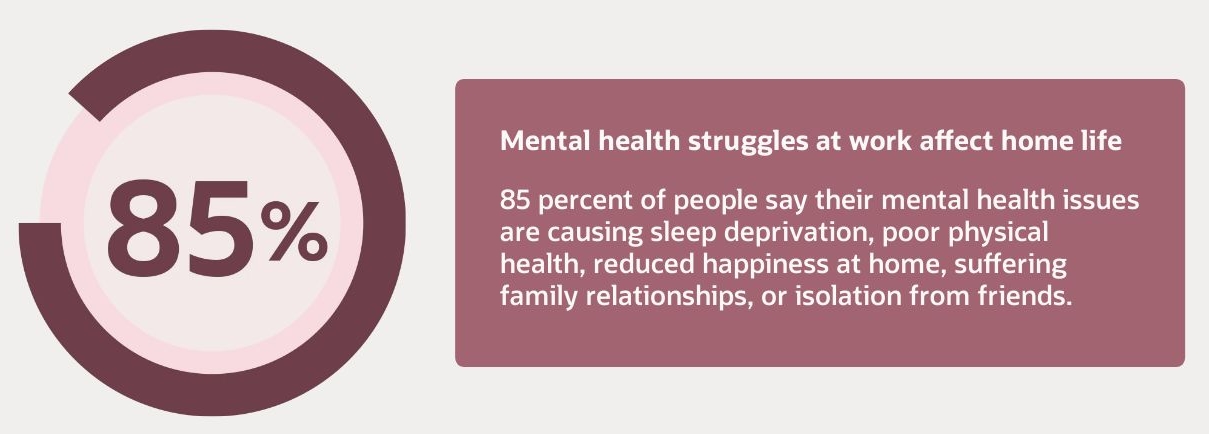
– The main repercussions are a lack of sleep (40%), a deteriorated physical health (35%), a worsening of the feeling of happiness at home (33%), complication of family relationships (30%) and a form of social isolation.
– With the generalization of remote working, the boundaries between the spheres of personal and professional life are getting smaller and smaller, with 35% of the total number of respondents say they work an additional 40 hours each month (29% in France) and 25% say they feel overworked.
– Despite the inconveniences attributable to remote work, 62% of respondents
worldwide believe that remote working is more attractive now than before the pandemic. Globally, they say they can devote more than time to their family (51%), to sleep (31%) and to their work (30%).
Employees need help and prefer to seek support from technology rather than from their manager… but this trend doesn’t match everywhere.
Employees expect more from technology than just the provision of collaborative tools; they want to be able to rely on technology to help them with their mental health.
Only 18% of respondents worldwide would turn to their manager rather than to robots to preserve their mental health because they feel that the robots cannot show judgment (34%), that they represent a means of to share problems impartially (30%) and are able to bring in quick answers to health questions (29%).
– 68% of respondents would prefer to talk about their stress and anxiety problems at work with a robot rather than their manager and 80% are in favor of the idea of having a robot as a therapist or counsellor. In France this trend is less flagrant but 68% would still be in favour of it. It is in China where this is much more pronounced, as 97% of them share this point of view.

– 75% say that artificial intelligence has helped improve their mental health at work. AI would provide them with the information they need to work in the workplace more efficiently (31% globally compared to only 19% in France), automate certain tasks and reduce the workload to avoid the risk of overwork (27% globally) and 27% consider that AI can help reduce their stress by helping them to prioritize their tasks (vs. 19% in France)
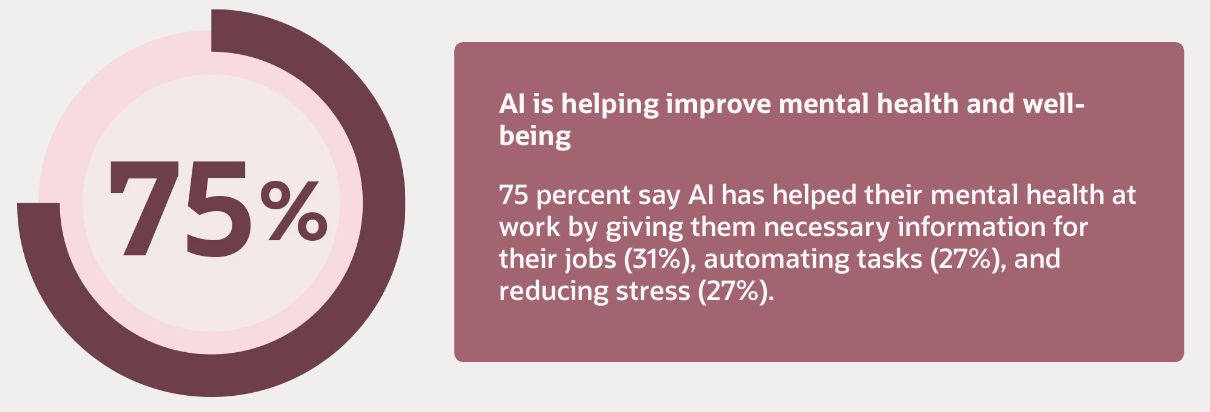
– Artificial intelligence would have already enabled half of the employees to shorten their work week and take longer vacations (51% globally – 35% in France). More than half of the respondents indicated that artificial intelligence allows for increase employee productivity (63% globally- 45% in France), contributes to improving job satisfaction (54% globally – 37% in France) and improving general well-being (52% globally – 37% in France).
Mental health problems in the workplace will continue to exist and should not be ignored.
Around the world, employees want companies to do more to address mental health issues in the workplace. If this support is lacking, then it may well have an impact on global productivity and on the personal and professional lives of employees. In addition, the period of containment also demonstrated that the use of technology (video conferences, online sports activities, mobile apps, etc.) offered an escape route in a particularly stressful period.
- 76% believe their company should do more to preserve mental health of employees.
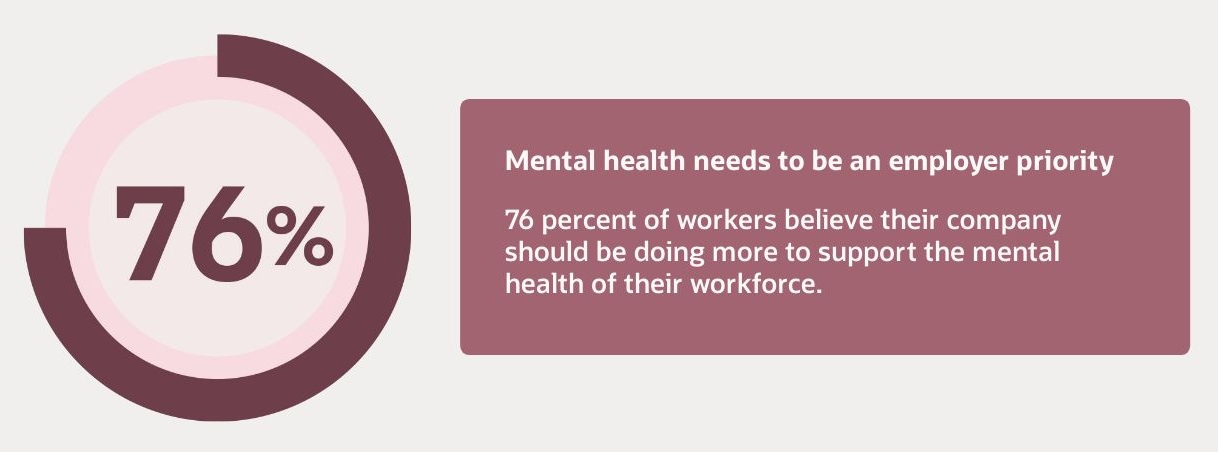
- 51% said that their company had set up dedicated services or some form of support by mental health following the COVID-19 pandemic
- 83% of employees around the world would like their company to provide the technologies needed to support their mental health such as self-serve access to health resources (36%), self-service on-demand consulting services (35%), proactive health monitoring tools (35%), access to applications dedicated to wellness and meditation (35%), and chatbots to answer health questions (28%).
- 84% of employees say that they have encountered difficulties in remote working such as the lack of a balance between work and personal life (41%) and the impact on mental health such as the stress and anxiety (33% on average).
- 42% indicate that stress, anxiety and depression reduce their productivity and 40% say it leads them to make bad decisions.
Between the new reality of work and work-life imbalance, COVID-19’s assessment of our mental health is significant – and it’s an issue that workers in all sectors and countries are facing, says Dan Schawbel, managing partner of Workplace Intelligence. “The pandemic has brought mental health to the forefront and it is one of the most important workplace concerns of our time and will continue to be so for the next decade. The results of our study show how widespread this problem has become and why it is so widespread. It’s time for organizations to start talking about it and exploring new solutions.”
“With the global pandemic, mental health has become not only a health issue, but also a social issue, and a major challenge in the workplace. It has a profound impact on individual performance, team effectiveness and organizational productivity.
Now, more than ever, it is a conversation that needs to take place and employees are looking to employers to take the lead and provide solutions, said Emily He, Senior Vice President, Oracle Cloud HCM. “There’s a lot of work to be done to support the mental health of employees around the world and technologies like AI can help. But first, organizations must make mental health a priority. If we manage to launch these debates, both at HR and management levels, we will be able to initiate change. And that’s time now to get started.
To Go Further
“In order for employees to talk to their employers about their work-anxiety problems, employers would have to listen to them and empathize with them . It is therefore a question for managers to create a link with their employees, to take them into consideration.” says @RosyCoaching.
Can’t agree more with the analysis of Dan Schawbel, Emily He, and Rosy.
I would like to add a few ideas that I feel are essential to improving mental health in the workplace. As I have been saying for a long time now, respect for employees is the key to well-being in the workplace. And when I say respect, it encompasses several parameters:
– having empathetic and more horizontal management
– paying employees decently and eliminate the differences in wages between men and women
– Fostering diversity and inclusion in the workplace

Without a rapid awareness of these important aspects of equity at work by economic decision-makers, confidence, essential for a rebound of the world economy, will not be there, neither will ethics and the world will not be better off, quite the contrary, a world already shaken by the unprecedented health crisis of Covid-19.
AI (used for the public good and by eliminating/reducing possible bias problems) and especially a change of mentality in the management of employees will be the keys to a successful future of work.
To learn more about this global study, feel free to click here : Oracle & Workplace Intelligence Global Survey on AI at Work
___________________________________________________________________ Special thanks to Bastien Rousseau for his precious help for this article. Infographic courtesy of Oracle







![The Incredible Growth of Fintech [Infographic]](http://ipfconline.fr/blog/wp-content/uploads/2018/02/31-01-2018-growth-of-fintech-1-218x150.jpg)
![FINE LIST OF 50 TOP WORLD BIG DATA EXPERTS TO FOLLOW IN 2017 [WITH MOZ SOCIAL SCORE]](http://ipfconline.fr/blog/wp-content/uploads/2017/05/Capture0000001ALTERN-218x150.jpg)

![FINE LIST OF 30 TOP WORLD INSURTECH EXPERTS TO FOLLOW IN 2017 [WITH MOZ SOCIAL SCORE]](http://ipfconline.fr/blog/wp-content/uploads/2017/05/hgfhfh1-218x150.jpg)







